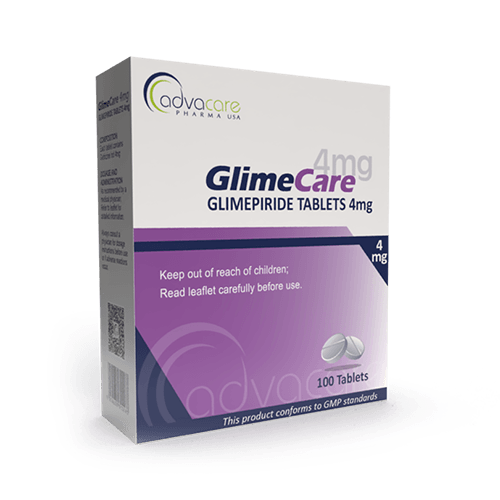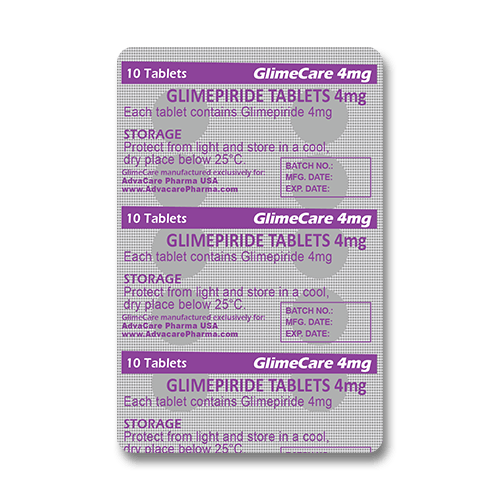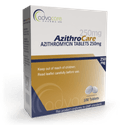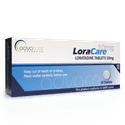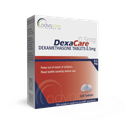- Home›
- Pharmaceuticals›
- Pharmaceutical Tablets›
- Glimepiride Tablets
Glimepiride Tablets
Dosage
Packaging
What is Glimepiride?
Active Ingredients: Glimepiride
Glimepiride Tablets are used to manage glucose levels in patients with type 2 diabetes. It is used in combination with a diet and exercise program. This drug may be used alone or with other antidiabetic medications, such as insulin or metformin. It is not used to treat type 1 diabetes.
Glimepiride is an antidiabetic drug belonging to the group of medicines called sulfonylureas. It works by increasing the amount of insulin produced by the pancreas. Because of this, it is only effective in patients who have some pancreatic beta cell function. This drug also can increase insulin sensitivity at peripheral target sites, which can help the body to use insulin more effectively.
Glimepiride Tablets are produced with a dosage of 1mg, 2mg, or 4mg. Tablets are packaged in blisters of 10 tablets each and are available in boxes of 30 tablets or 100 tablets.
AdvaCare Pharma is a producer and exporter of Glimepiride Tablets. Our supply chain is thoroughly vetted to ensure it meets health, safety, and environmental standards. This medication is manufactured in our GMP-certified facilities in China, India, and the USA.
Why are we a trusted Glimepiride manufacturer?
We are a Glimepiride manufacturer engaged in the global distribution of 200+ oral solid pharmaceutical products in tablet dosage form.
As an American-owned and operated company, we are devoted to the manufacture and supply of superior quality, yet cost-effective pharmaceuticals to improve access to healthcare solutions worldwide. AdvaCare Pharma manufactures Glimepiride Tablets, and over 500 other pharmaceutical treatments, according to strict GMP regulations as part of our global commitment to bring efficacious medicines to pharmaceutical distributors, hospitals, pharmacies and other medical institutions.
Uses
What is Glimepiride used for?
It is used to lower blood sugar levels associated with type 2 diabetes.
How should Glimepiride Tablets be used?
This medication is intended to be taken orally. Glimepiride Tablets should be taken just before or with the first meal of the day. Do not skip meals when taking this medication.
What is the best time to take Glimepiride?
It is recommended to take this medication with breakfast or the first main meal of the day.
How should Glimepiride Tablets be stored?
It is recommended to keep the tablets in their original packaging. When not being used, the medication should be stored in a dark, cool place. Keep the tablets out of the reach of children and pets.
What dose should be taken?
Adult Dosing For type 2 diabetes mellitus, the usual dose is 1-4mg per day. The starting dose should be 1-2mg taken once per day. The dosage can be increased by 1-2mg/day every 1-2 weeks. The maximum dosage per day is 8mg. Tablets should be taken with the first main meal of the day.
When switching therapy to Glimepiride from other oral hypoglycemic drugs, it is important to observe the patient carefully for the first two weeks due to the long half-life of Glimepiride. If there is an inadequate glycemic response to this drug at the maximum dose, it is advised to consider combination therapy with insulin or metformin.
Renal Dosing The recommended adjustments are as follows:
- For patients with renal impairment, the starting dose should be 1mg each day. It is advised to titrate slowly based on fasting blood glucose levels.
- For HD/PD, the starting dose should be 1mg each day. No supplement is defined. It is advised to titrate slowly.
Hepatic Dosing For patients with hepatic impairment, it is recommended to use a starting dose of 1mg each day. It is recommended to titrate slowly based on fasting blood glucose levels. Glimepiride is not recommended for use in patients with severe hepatic impairment.
Geriatric Dosing For type 2 diabetes mellitus, the usual dose is 1mg taken each day. The prolonged use of this drug has been associated with hypoglycemia. The dose should be titrated at weekly intervals in order to reduce the risk of hypoglycemia, and patients should be monitored for any symptoms.
Pediatric Dosing For type 2 diabetes mellitus (off-label), the usual dose is 1-4mg taken per day. The starting dose should be 1-2mg taken once per day. The dosage can be increased by 1mg per day every 1-2 weeks. The maximum dosage per day is 8mg. Tablets should be taken with the first main meal of the day. Glimepiride should be used in combination with metformin.
Renal Dosing for pediatrics Adjustment guidelines are not defined for children with renal impairment. It is recommended to consider the recommendations for adults.
Hepatic Dosing for pediatrics Adjustment guidelines are not defined for children with hepatic impairment. It is recommended to consider the recommendations for adults.
The dosage is based on medical condition, response to treatment, age, and weight. Refer to a doctor or pharmacist for guidelines on dosage. Do not exceed what they advise.
What happens if a dose is missed?
The missed tablet should be taken as soon as possible. If it is almost time for the next dose, then the missed dose should be skipped. Never take 2 doses at the same time.
Who can use Glimepiride Tablets?
Glimepiride Tablets can be given to adults and children, but caution is advised for specific groups of patients.
Pregnant This drug should be used cautiously in pregnant women and the benefits of its use must be weighed against the risks, particularly in the 3rd trimester. It is advised to discontinue therapy at least 2 weeks before delivery. There is not enough human data available to properly assess the risks, but there has been a risk of neonatal hypoglycemia associated with the use of other sulfonylureas.
Breastfeeding It is advised to monitor the infants who are being breastfed by women taking Glimepiride for signs of hypoglycemia. It is unknown if Glimepiride is passed in milk. There is no available human data to properly examine the effects of this drug on milk production.
Children Glimepiride is not recommended for use in pediatric patients as there is a risk of hypoglycemia and an effect on body weight.
Geriatric Glimepiride and other long-acting sulfonylureas are not recommended for elderly patients, as there is an increased risk of hypoglycemia. Dose recommendations may be necessary for this population.
Other warnings
Glimepiride is contraindicated for patients with a hypersensitivity or allergy to sulfa drugs.
This drug is contraindicated for patients with type 1 diabetes, diabetic ketoacidosis, and complicated gestational diabetes mellitus.
It is advised to use this drug cautiously in patients with an increased risk of severe hypoglycemia, such as patients who are elderly, debilitated, or malnourished, those with adrenal or pituitary insufficiency, and patients under stress (e.g. infection, fever, trauma, surgery).
Treatment with Glimepiride may need to be discontinued in patients experiencing heightened levels of stress.
For patients with autonomic neuropathy, hypoglycemic symptoms may not be easily recognizable.
There is an increased risk of bone fracture and cardiovascular mortality associated with this medication.
Fluid retention may occur, so caution is advised when treating patients with heart failure.
Side Effects
As with all pharmaceuticals, some unwanted effects can occur from the use of Glimepiride Tablets.
Common side effects include, but may not be limited to:
- low blood sugar
- dizziness
- nausea
- headache
- weakness
Call a doctor if the following develops:
- signs of a liver problem (e.g. yellow skin, dark-colored urine)
- unusual bruising or bleeding
- diarrhea
- fever
- sore throat
Some severe side effects that have been reported include:
- hypersensitivity reactions including anaphylaxis, angioedema, and Stevens-Johnson Syndrome
- hemolytic anemia (with or without G6PD deficiency)
- hepatic impairment, hepatitis, liver failure
- leukopenia
- agranulocytosis
- aplastic anemia
- pancytopenia
- thrombocytopenia
For a comprehensive understanding of all potential side effects, consult a medical professional.
If any symptoms persist or worsen, or you notice any other symptoms, please call your doctor immediately.
Precautions
Do NOT use Glimepiride Tablets if:
- You are allergic to any of the ingredients.
- You are hypersensitive or allergic to sulfonylureas or sulfonamides.
- You are pregnant and within 2 weeks of delivery.
- You have severe kidney or liver disease.
- You have diabetic ketoacidosis (with or without coma).
- You have type I diabetes mellitus.
Before treatment, consult your doctor regarding any medications you are taking to address potential drug interactions.This drug may not be as effective when used at the same time as other medications or there may be an increased risk of adverse effects when combined with certain drugs. Some drugs with known interactions include methenamine, aminolevulinic acid (topical), glipizide, glyburide, and porfimer. It is also known to have interactions with many other drugs, such as certain antipsychotics, hormonal birth control, steroids, and antibiotics. It is important to discuss any supplements or herbal products you are taking, as this medicine may interact with substances such as aloe, cassia cinnamon, ginkgo, ginseng, garlic, milk thistle, and more. This is not a complete list of possible interactions.
Alcohol should be avoided when taking Glimepiride Tablets, as it increases the risk of hypoglycemia.
This medication may not be suitable for people with certain conditions, so it is important to consult with a doctor if you have any health conditions, such as:
- heart disease
- liver or kidney problems
- glucose-6-phosphate dehydrogenase deficiency (G6PD)
- pregnancy or breastfeeding
References
A Placebo-Controlled, Randomized Study of Glimepiride in Patients with Type 2 Diabetes Mellitus for Whom Diet Therapy is Unsuccessful
This is a multicenter, randomized, placebo-controlled study of glimepiride. This drug is a new oral sulfonylurea and the drug was applied in patients with type 2 diabetes for whom dietary treatment was unsuccessful (fasting plasma glucose [FPG] = 151–300mg/dL) during a 1-week screening period.
Patients were separated into two groups. One group consisted of 123 patients who received glimepiride, while the other group consisted of 126 patients who received a placebo once daily for a 10-week dose-titration period, then maintained on an individually determined optimal dose (1–8mg of glimepiride or placebo) for 12 weeks.
Glimepiride reduced fasting plasma glucose (FPG) by 46mg/dL, hemoglobin A1C (HbA1C) by 1.4%, and 2-hour postprandial glucose by 72mg/dL compared to placebo. It enhanced postprandial insulin and C-peptide responses without causing clinically significant increases in fasting insulin or C-peptide levels. Good glycemic control (HbA1C ≤ 7.2%) was achieved by 69% of patients taking glimepiride, compared to 32% of those taking placebo.
The findings from this study indicate that glimepiride is safe and effective for the treatment of patients with type 2 diabetes for whom diet therapy is unsuccessful.

You might be interested in...
Why AdvaCare Pharma?
As an industry leader, we are aware of our responsibility to provide affordable and sustainable solutions to improve healthcare worldwide.
